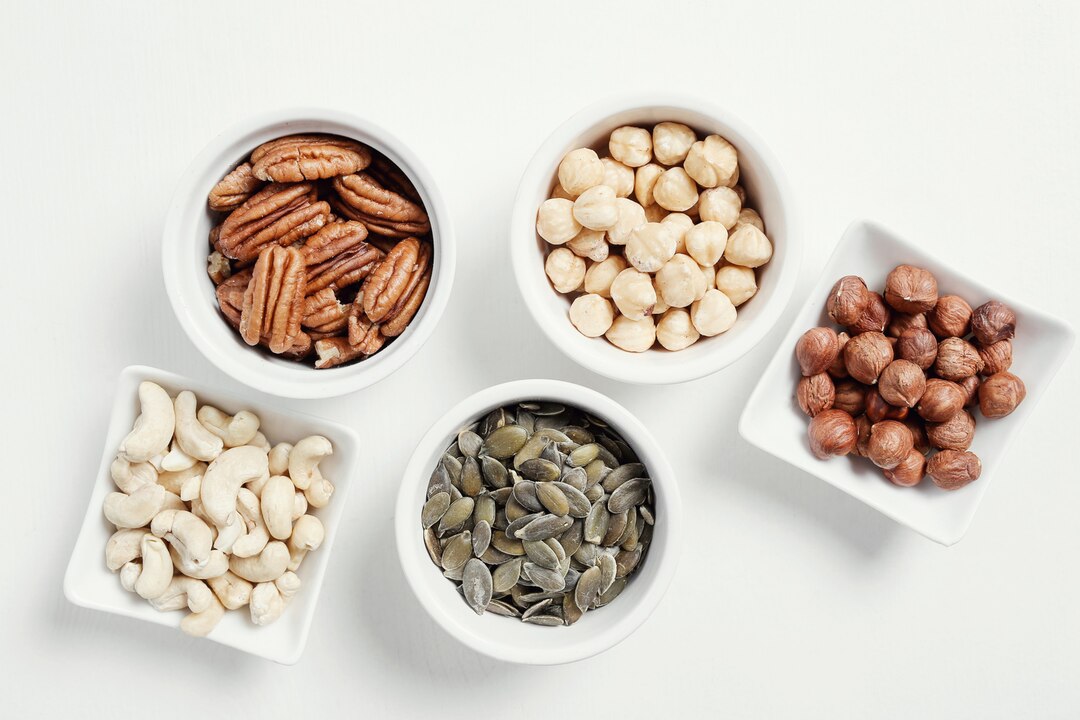Nuts and seeds are nutrient-dense powerhouses that offer a variety of health benefits, from boosting heart health to supporting weight management. They are packed with healthy fats, protein, vitamins, and minerals, making them excellent additions to any diet. Whether you’re looking for a snack or a way to enhance your meals, here are 10 nuts and seeds to incorporate into your daily routine.
1. Almonds
Almonds are one of the most popular nuts, and for good reason. They are an excellent source of vitamin E, an antioxidant that helps protect cells from oxidative stress. Almonds are also rich in fiber, protein, and healthy monounsaturated fats, which can help lower bad cholesterol and support heart health.
How to incorporate them:
Enjoy almonds as a snack, add them to salads, or blend them into smoothies for an extra crunch.
2. Walnuts
Walnuts are packed with omega-3 fatty acids, which are known for their heart-protective benefits. They also contain antioxidants, fiber, and protein, making them great for supporting brain health and reducing inflammation.
How to incorporate them:
Add chopped walnuts to oatmeal, yogurt, or baked goods, or eat them on their own as a healthy snack.
3. Cashews
Cashews are rich in copper, magnesium, and zinc, which are essential for energy production, bone health, and immune function. They also provide a good amount of healthy fats and protein.
How to incorporate them:
Use cashews in stir-fries, salads, or as a creamy base for dairy-free sauces and dressings.
4. Chia Seeds
Chia seeds are tiny but mighty. They are an excellent source of omega-3 fatty acids, fiber, protein, and antioxidants. Chia seeds are known for their ability to absorb liquid and form a gel-like consistency, making them perfect for hydration and digestive health.
How to incorporate them:
Add chia seeds to smoothies, mix them into yogurt, or make chia pudding by soaking them in almond milk overnight.
5. Flaxseeds
Flaxseeds are rich in omega-3 fatty acids, lignans (a type of antioxidant), and fiber. These nutrients support heart health, improve digestion, and may reduce the risk of certain cancers. Flaxseeds also help regulate blood sugar levels and promote healthy skin.
How to incorporate them:
Sprinkle ground flaxseeds on cereal, mix them into smoothies, or use them as an egg substitute in baking by mixing with water.
6. Pumpkin Seeds
Pumpkin seeds, also known as pepitas, are loaded with magnesium, zinc, iron, and healthy fats. These nutrients contribute to heart health, immune function, and strong bones. Pumpkin seeds are also a great source of antioxidants that help reduce inflammation.
How to incorporate them:
Snack on roasted pumpkin seeds, add them to salads, or sprinkle them on top of soups and baked goods for extra texture.
7. Sunflower Seeds
Sunflower seeds are high in vitamin E, an antioxidant that supports skin health, and magnesium, which promotes muscle function and relaxation. They also provide a good source of protein and healthy fats.
How to incorporate them:
Add sunflower seeds to trail mix, use them as a topping for oatmeal, or sprinkle them on salads and grain bowls.
8. Pistachios
Pistachios are rich in fiber, protein, and healthy fats, which make them a satisfying and nutritious snack. They also contain potassium and vitamin B6, which are important for heart health and energy production.
How to incorporate them:
Snack on pistachios alone, add them to granola, or use them in savory dishes like pesto or as a garnish for meat and vegetable dishes.
9. Hazelnuts
Hazelnuts are an excellent source of monounsaturated fats, vitamin E, and antioxidants. These nutrients contribute to heart health and may reduce the risk of chronic diseases. Hazelnuts are also known for their ability to improve cognitive function and support skin health.
How to incorporate them:
Add chopped hazelnuts to baked goods, sprinkle them on salads, or blend them into smoothies for a rich, nutty flavor.
10. Brazil Nuts
Brazil nuts are a rich source of selenium, a mineral that plays a key role in thyroid function, immune health, and antioxidant defense. Just a small handful of Brazil nuts can provide your daily recommended intake of selenium, making them an effective nutrient booster.
How to incorporate them:
Eat Brazil nuts on their own as a snack, or chop them up and add them to trail mix, granola, or desserts.
Incorporating a variety of nuts and seeds into your diet is an easy way to enhance your nutrition and boost overall health. Each nut and seed offers unique benefits, from heart-healthy fats to brain-boosting nutrients. By adding these nutrient-dense foods to your meals and snacks, you can promote better digestion, improve cardiovascular health, and support your immune system. So, why not add a handful of these powerful foods to your daily routine for a delicious and nutritious boost?








